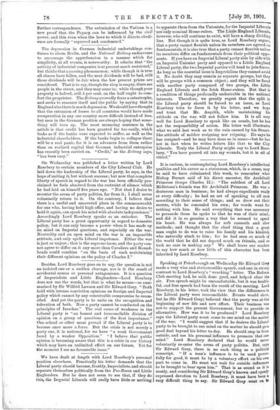The depression in German industrial undertakings con- tinues to alarm
Berlin, and the National Zeitung endeavours to encourage the apprehension in a manner which for simplicity, at all events, is noteworthy. It admits that "the activity of industrial companies is at present much restricted," but thinks that a passing phenomenon; while though it is true all shares have fallen, and the next dividends will be bad, still those dividends will be fair when the low present prices are considered. That is to say, though the shop is empty. there are people in the street, and they may come in; while though your property is halved, still 5 per cent, on the half ought to com- fort the proprietor. The Zeitung avowedly fears a catastrophe, and seeks to reassure itself and the public by saying that in England also there is much depression. We should have thought that the extension of losses to all countries would have made recuperation in any one country more difficult instead of less, but men in the German position are always hoping that some- thing will turn up. The most menacing sentence in the article is that credit has been granted far too easily, which looks as if the banks were expected to suffer, as well as the industrial shareholders. If the banks begin to collapse there will be a real panic, for it is on advances from them rather than on realised capital that German industrial enterprise has recently been carried on. "Credit," as the Zeitung says, "has been easy."


































 Previous page
Previous page